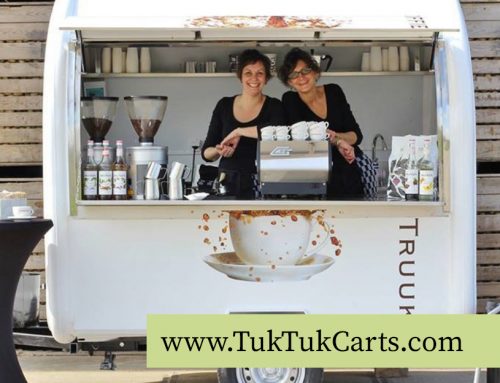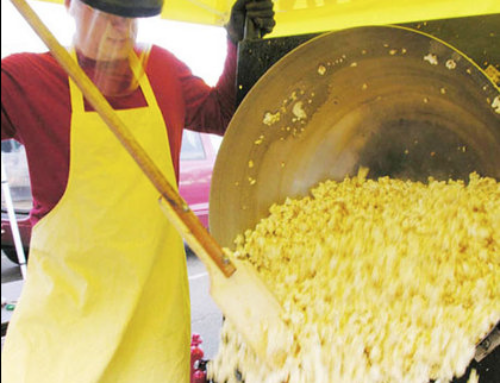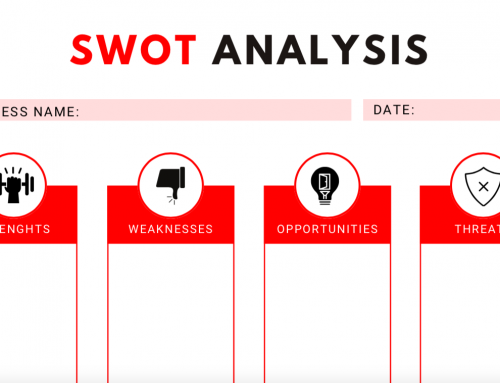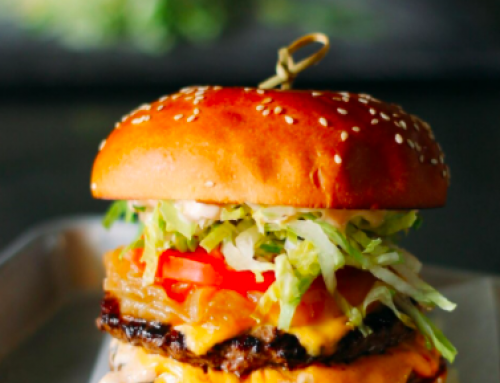Podcast: Play in new window | Download | Embed
Subscribe: RSS
Believe it or not old school food booth vendors understand what they’re doing when it comes to making money. This interview should be required listening for anyone that owns a food business. If you own a restaurant, concession trailer, food truck or cart following the advice passed on by this concession veteran will make you more money.
This program is also a lesson in not judging a book by it’s cover. You might think that the typical concession worker is just trying to make ends meet with their business, but that’s not always the case. As you’ll learn in this conversation, some of these entrepreneurs are quietly building large concession empires that routinely hit $20,000 – $40,000 in gross monthly revenue depending on the month.
Why Hire a Local Vendor Share Their Secrets?
A little background to this interview. I’m currently in the research phase to start my own mobile food business. One of the finalists ideas is a popcorn or kettle corn business. You can learn more about advantages of why I like this particular business in this podcast. Since this business is on my short list, I thought it would be beneficial to go out and talk to one of the most popular kettle corn business man or woman in my area. I wanted to find someone that already understood the area, the demand for this product, what the best places to vend are and general information about getting licensed in my area.
To find someone that sold kettle corn locally was not hard. I conducted two Google searches for kettle corn vendor + my town name and found a couple different businesses on Facebook that looked legit and popular. I sent these individuals a message that were two sentences in length. I let them know I wanted to learn more about the business. I wanted to pay them for consulting. One of the business owners responded by stating he charged $100 for a one hour conversation. I agreed. We planned to meet at a local Starbucks to discuss the business. This podcast is the recording of our discussion. I have not mentioned the name of this specific vendor and the business by their request, but was given permission to record the conversation.
Dave Krolak, owner and chef of the super successful Pierogi Food Truck in Basking Ridge, New Jersey, took a similar approach when he got started that I thought was brilliant. Dave reached out to one of the most successful food truck operators in his area and offered to compensate him a few thousand dollars to spend time with him, learn his business, and form a relationship. This straight-forward approach helped fast-tracked the relationship and get Pierogi Food Truck off to a fast start. It may have even helped them win a 2nd place trophy at their first ever food truck event with a total of 28 trucks!
You can view a photo of customers lining up in front of Dave’s truck below. If you happen to live with 400 miles of Basking Ridge definitely hit them up. You could even hire out the truck for your next Eastern-European themed party or wedding. Dave was also in the most recent class of Food Truck Academy and he is a really great guy so I recommend saying hello as well!
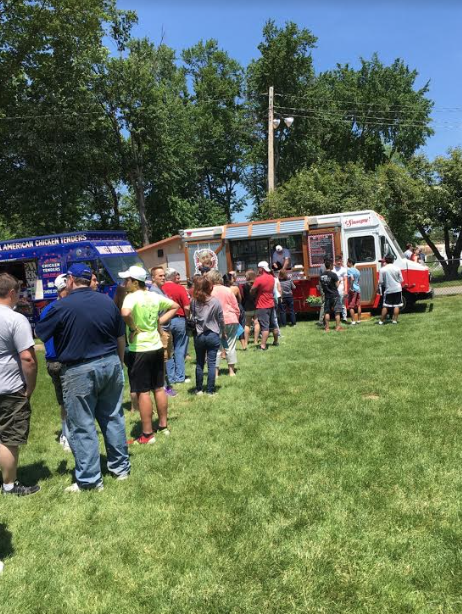
People love pierogis.
Our Conversation
As mentioned earlier, I met this experienced vendor at a nearby Starbucks during the middle of the week. You’ll notice the background music / noise in this recording that I wasn’t able to get removed from the audio so apologize for that. This was recorded straight from my iPhone. The music does get a bit annoying, but the audio overall is good.
Although I didn’t realize it when I booked the meeting this was not your average food booth vendor with a single location and kettle corn tent hanging up his shingle. This is someone that over the past 20 years has built up a food stand business that served between 20 – 30 farmers markets weekly. Obviously this volume of events makes it impossible to handle as a solo operator. This entrepreneur hired out numerous part-time employees, including family members and his teenage kids to vend at different farmer’s markets and events in 100 mile radius of his home base.
Based on the revenue generated from this business, this outwardly simple concession stand owner had used his business profits to go and invest in different real estate like homes and apartment buildings outside of the state. A semi-passive real estate portfolio is something most folks wouldn’t expect to be the result of a concession business.

Lessons Learned
Below is a summary of the key takeaways from our conversation. Listen to the full audio for all the details. As mentioned earlier, the insights were well worth the $100 invested and could have potentially taken me years to learn on my own.
Diversifying Your Product Line: One major takeaway from our conversation was to think about ways to diversify your product offerings. You can never be really sure what product is going to be popular at a certain event. This vendor has a variety of different concession stand options that sell everything from kettle corn to hotdogs, burgers, lemonade, funnel cake and more. He has definitely implemented his own advice with his business.
I had reached out to this individual for advice operating a kettle corn business. One of the suggestions he had for my particular situation was to think about a drink or line of drinks to sell as well. We live in Southern California so there are a lot of hot days, especially during the summer months when many of the events are held. He recommended looking at a specialty flavor of ice tea. Tea has a very high-profit margin and is enjoyed by more than one half of the population each day according to TeaUSA.com. At a macro level, the ready to drink tea category increased by 4% in 2016 per the same source. This is also a simple product to make and I will be taking his advise to heart. I think this is the perfect complimentary product to popcorn as well.
One other example this entrepreneur cited was the business of Starbucks. This business started out by offering coffee as it’s main product. But has since branched out into other offerings like tea, breakfast sandwiches, lunch and even experimented with selling beer and wine in test locations. Although Starbucks is operating at much larger scale, the principal remains the same. If you offer more products, you have the opportunity to serve a wider range of customers with different tastes and sell high-average tickets to each customer.
Pricing Your Product: Don’t be afraid to change the price of your product depending on where you’re vending. Sometimes you may be able to charge as much as $10 for a single bag of kettle corn. Other times, if you’re vending at a flea market that attracts lower income people, you might have a difficult time charging $4.00 for that same bag. When you go out you want to charge the maximum you can for the product. Don’t feel bad about charging prices on the higher end of the scale and look for events where you can do this. Charging more will ensure you’re highly profitable, can hire staff, grow and reinvest into your business if that is the goal.
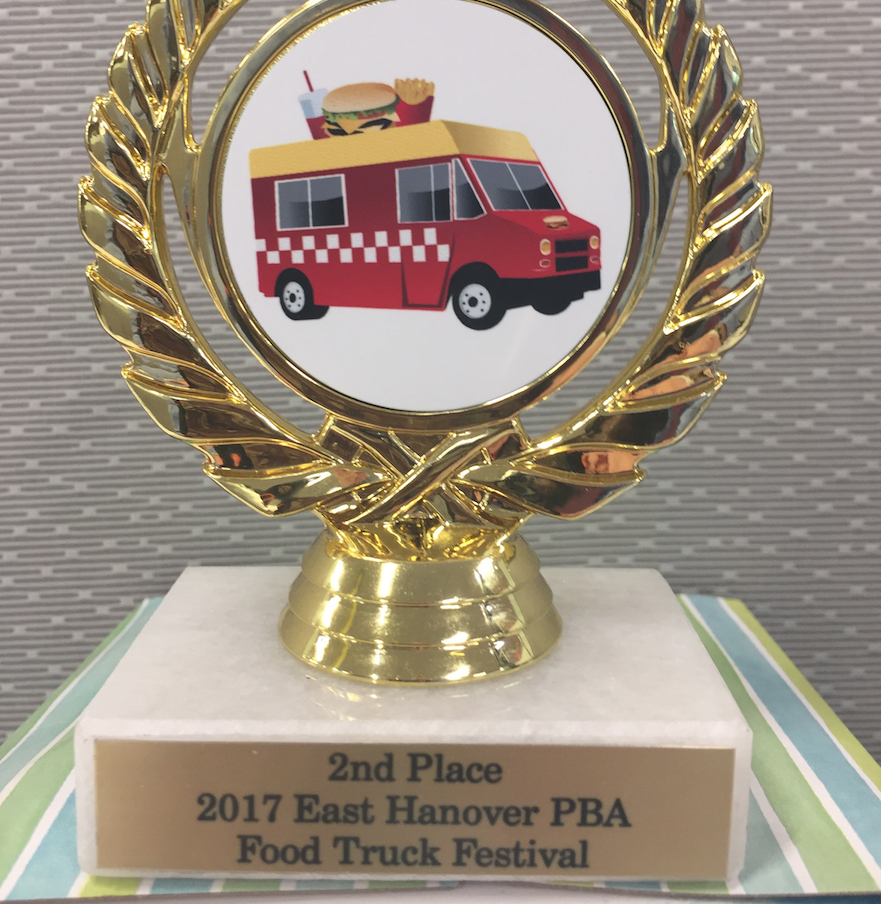
2017 East Hanover PBA Food Truck Festival Trophy Won by The Pierogi Food Truck.
Scaling a Food Business: Not all concession vendors stay small. The entrepreneur featured in this interview grew his business by selling more products in a wider range of locations. This is one way to grow revenue even when you’re not present at an event yourself! But there are some other local guys that started with a small concession business and went on to build a nationally recognized popcorn brand that you can buy at Costco and other stores. Scaling into retail sales will require a manufacturing facility, equipment, and a lot of investment capital. But you can establish your foothold in the local market with a booth or a food truck in the beginning with the long-term goal of establishing a larger business.
Understanding Your Local Market: Every market is different. What people enjoy doing and like to eat will vary depending on location. From a rules and regulation standpoint this is even more true for food trucks or carts. Each city you vend in may have different rules and requirements to serve food legally. A deeper understanding of some of the locations that are profitable and how to navigate local laws was hugely valuable and a massive time saver. Some great common sense advise for equipment you need to buy or not bring to events. The subtle legal distinction between temporary food facilities (TFF) versus food trucks is also explained. Some of the conversation focuses on the permits needed to vend in different counties / cities within Southern California and may not be applicable to your specific situation.
Equipment You Should Buy: Being off-the-grid can have it’s advantages. If you invest in the right equipment, you can avoid paying higher event registration fees or even get a more desirable location at an event. Many vendors will need to plugin to an electrical source of power at an event. If you own your own generator and can operate without assistance both in terms of power, water, or anything else you increase your vending options. For example, you might find that a certain spot at an event is shaded and has a high-volume of traffic. As long as the event planner allows it you’ll be able to position your trailer or booth appropriately in a spot that will maximize sales.
Bottom line: If you want to be successful in a particular business a great way to fast-track your journey toward success is to get around people that are already doing the things that you aspire to accomplish. One simple way to get around and learn from these people is to reach out to them and offer to pay them for their time and expertise. Not only is this approach a huge time saver for you, but it’s a terrific way to start a new relationship.

